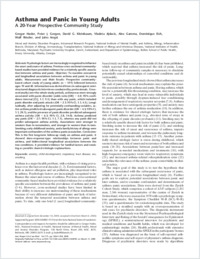Asthma and Panic in Young Adults: a 20-year prospective community study
DOKPE
- Hasler, Gregor ORCID University of Fribourg
- Gergen, Peter J. National Institutes of Health, Bethesda, Maryland
- Kleinbaum, David G. National Institutes of Health, Bethesda, Maryland
- Ajdacic, Vladeta National Institutes of Health, Bethesda, Maryland
- Gamma, Alex National Institutes of Health, Bethesda, Maryland
- Eich, Dominique National Institutes of Health, Bethesda, Maryland
- Rössler, Wulf National Institutes of Health, Bethesda, Maryland
- Angst, Jules National Institutes of Health, Bethesda, Maryland
- 2005
Published in:
- American Journal of Respiratory and Critical Care Medicine. - New York City : American Thoracic Society. - 2005, vol. 171, no. 11, p. 1224-1230
Critical Care and Intensive Care Medicine
Pulmonary and Respiratory Medicine
Anxiety
Child development
Respiratory tract disease
Sex
Smoking
English
Rationale: Psychologic factors are increasingly recognized to influence the onset and course of asthma. Previous cross-sectional community-based studies have provided evidence for a relatively specific association between asthma and panic.
Objectives: To examine concurrent and longitudinal associations between asthma and panic in young adults.
Measurements and main results: Prospective community-based cohort study of young adults (n = 591) followed between ages 19 and 40. Information was derived from six subsequent semistructured diagnostic interviews conducted by professionals. Cross-sectionally (over the whole study period), asthma was more strongly associated with panic disorder (odds ratio [OR] = 4.0; 95% confidence interval [CI], 1.7, 9.3) than with any panic, which included panic disorder and panic attacks (OR = 2.1; 95% CI, 1.1, 4.5). Longitudinally, after adjusting for potentially confounding variables, active asthma predicted subsequent panic disorder (OR = 4.5; 95% CI, 1.1, 20.1), and the presence of panic disorder predicted subsequent asthma activity (OR = 6.3; 95% CI, 2.8, 14.0). Asthma predicted any panic (OR = 2.7; 95% CI, 1.1, 7.1), whereas any panic did not predict subsequent asthma activity. Associations were stronger in smokers than in nonsmokers, and stronger in women than in men. Smoking, early-childhood anxiety, and a family history of allergy were important confounders of the asthma-panic association.
Conclusions: This is the first long-term follow-up study on asthma and panic. It showed dose-response-type relationships between panic and asthma, and bidirectional longitudinal associations between the two conditions. It provided evidence for familial factors and smoking as possible shared etiologic explanations.
Objectives: To examine concurrent and longitudinal associations between asthma and panic in young adults.
Measurements and main results: Prospective community-based cohort study of young adults (n = 591) followed between ages 19 and 40. Information was derived from six subsequent semistructured diagnostic interviews conducted by professionals. Cross-sectionally (over the whole study period), asthma was more strongly associated with panic disorder (odds ratio [OR] = 4.0; 95% confidence interval [CI], 1.7, 9.3) than with any panic, which included panic disorder and panic attacks (OR = 2.1; 95% CI, 1.1, 4.5). Longitudinally, after adjusting for potentially confounding variables, active asthma predicted subsequent panic disorder (OR = 4.5; 95% CI, 1.1, 20.1), and the presence of panic disorder predicted subsequent asthma activity (OR = 6.3; 95% CI, 2.8, 14.0). Asthma predicted any panic (OR = 2.7; 95% CI, 1.1, 7.1), whereas any panic did not predict subsequent asthma activity. Associations were stronger in smokers than in nonsmokers, and stronger in women than in men. Smoking, early-childhood anxiety, and a family history of allergy were important confounders of the asthma-panic association.
Conclusions: This is the first long-term follow-up study on asthma and panic. It showed dose-response-type relationships between panic and asthma, and bidirectional longitudinal associations between the two conditions. It provided evidence for familial factors and smoking as possible shared etiologic explanations.
- Faculty
- Faculté des sciences et de médecine
- Department
- Master en médecine
- Language
-
- English
- Classification
- Pathology, clinical medicine
- License
-
License undefined
- Open access status
- green
- Identifiers
-
- DOI 10.1164/rccm.200412-1669OC
- ISSN 1073-449X
- Persistent URL
- https://folia.unifr.ch/unifr/documents/327487
Statistics
Document views: 83
File downloads:
- hasleretal.2005: 129
